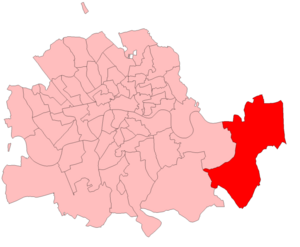Woolwich (UK Parliament constituency) facts for kids
Quick facts for kids {{{Name}}}[[{{{Type}}} constituency]] |
|
|---|---|
| [[Image:{{{Map1}}}Constituency.svg|120px|]] [[Image:England{{{Map2}}}.svg|120px|]] |
|
| {{{Name}}} shown within [[{{{Entity}}}]], and {{{Entity}}} shown within England | |
| Created: | {{{Year}}} |
| MP: | {{{MP}}} |
| Party: | {{{Party}}} |
| Type: | House of Commons |
| County: | [[{{{County}}}]] |
| EP constituency: | [[{{{EP}}} (European Parliament constituency)|{{{EP}}}]] |
Woolwich was an area in the United Kingdom that had its own representative in the House of Commons. The House of Commons is part of the UK Parliament, where laws are made.
The Woolwich area was represented by a Member of Parliament (MP) for two periods: first from 1885 to 1918, and then again from 1983 to 1997. This area is located in Woolwich, which is now part of the Royal Borough of Greenwich in south-east London.
One famous MP for Woolwich was Will Crooks. He served from 1903 to 1910 and again from 1910 to 1918. Will Crooks was important because he was one of the very first MPs from the Labour Party in the United Kingdom.
Contents
History of Woolwich's Parliament Seat
The Woolwich parliamentary seat changed its shape and name several times over the years.
In 1918, the original Woolwich seat was split into two new areas: Woolwich East and Woolwich West. This meant that instead of one MP for Woolwich, there were now two MPs for these smaller areas.
Later, in 1983, the Woolwich seat was brought back. Most of the old Woolwich West area became a new seat called Eltham. The recreated Woolwich seat was mostly made up of the former Woolwich East area.
Then, in 1997, the Woolwich seat was changed again. Parts of it joined a nearby area to form Erith and Thamesmead. Another part of Woolwich combined with the Greenwich seat to create the new Greenwich and Woolwich seat.
Boundaries of the Woolwich Area
The boundaries of the Woolwich parliamentary area changed over time. These boundaries define which streets and neighborhoods belong to a specific voting area.
Woolwich Boundaries: 1885 to 1918
During this period, the Woolwich area included the parishes (local church districts) of Woolwich, Eltham, and Plumstead.
Woolwich Boundaries: 1983 to 1997
When the Woolwich seat was brought back, its boundaries were different. It included several wards (smaller local areas) within the London Borough of Greenwich. These wards were Abbey Wood, Arsenal, Burrage, Eynsham, Glyndon, Lakedale, Plumstead Common, St Mary's, St Nicholas, Shrewsbury, Slade, Thamesmead Moorings, and Woolwich Common.
Members of Parliament for Woolwich
People who represented the Woolwich area in Parliament were called Members of Parliament, or MPs. Here are the MPs who served Woolwich during its two periods.
MPs from 1885 to 1918
| Election | Member | Party | |
|---|---|---|---|
| 1885 | Edwin Hughes | Conservative | |
| 1902 by-election | Lord Charles Beresford | Conservative | |
| 1903 by-election | Will Crooks | Labour | |
| 1910 (January) | William Augustus Adam | Conservative | |
| 1910 (December) | Will Crooks | Labour | |
| 1918 | The area was split into Woolwich East and Woolwich West. | ||
MPs from 1983 to 1997
| Election | Member | Party | Notes | |
|---|---|---|---|---|
| 1983 | John Cartwright | SDP | He was previously the Labour MP for Woolwich East. | |
| 1988 | SDP (1988) | |||
| 1990 | Independent Social Democrat | |||
| 1992 | John Austin-Walker | Labour | ||
| 1997 | The area was changed. See Erith & Thamesmead and Greenwich & Woolwich. | |||
 | Dorothy Vaughan |
 | Charles Henry Turner |
 | Hildrus Poindexter |
 | Henry Cecil McBay |


